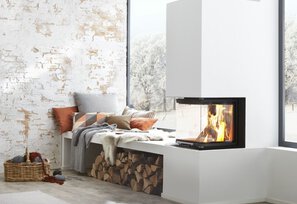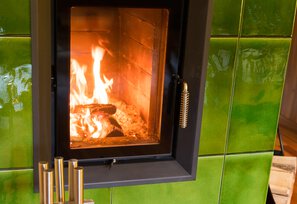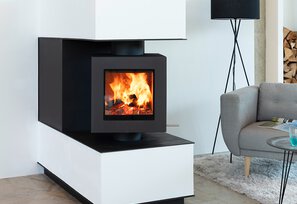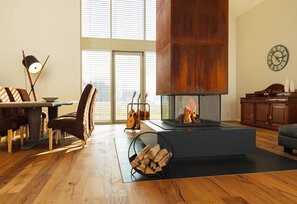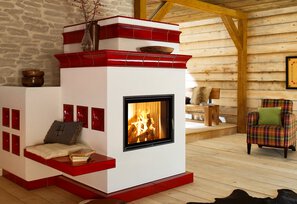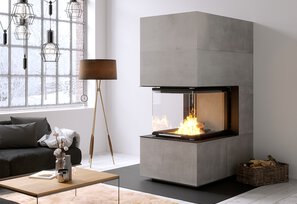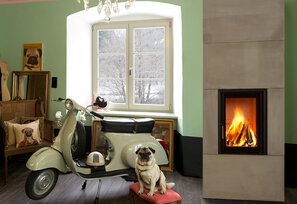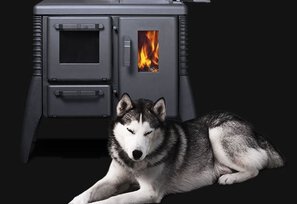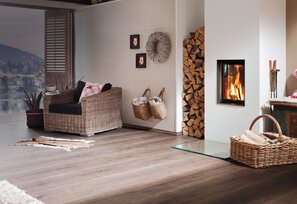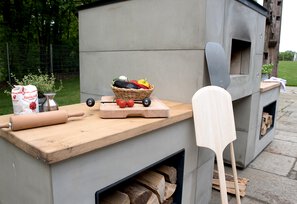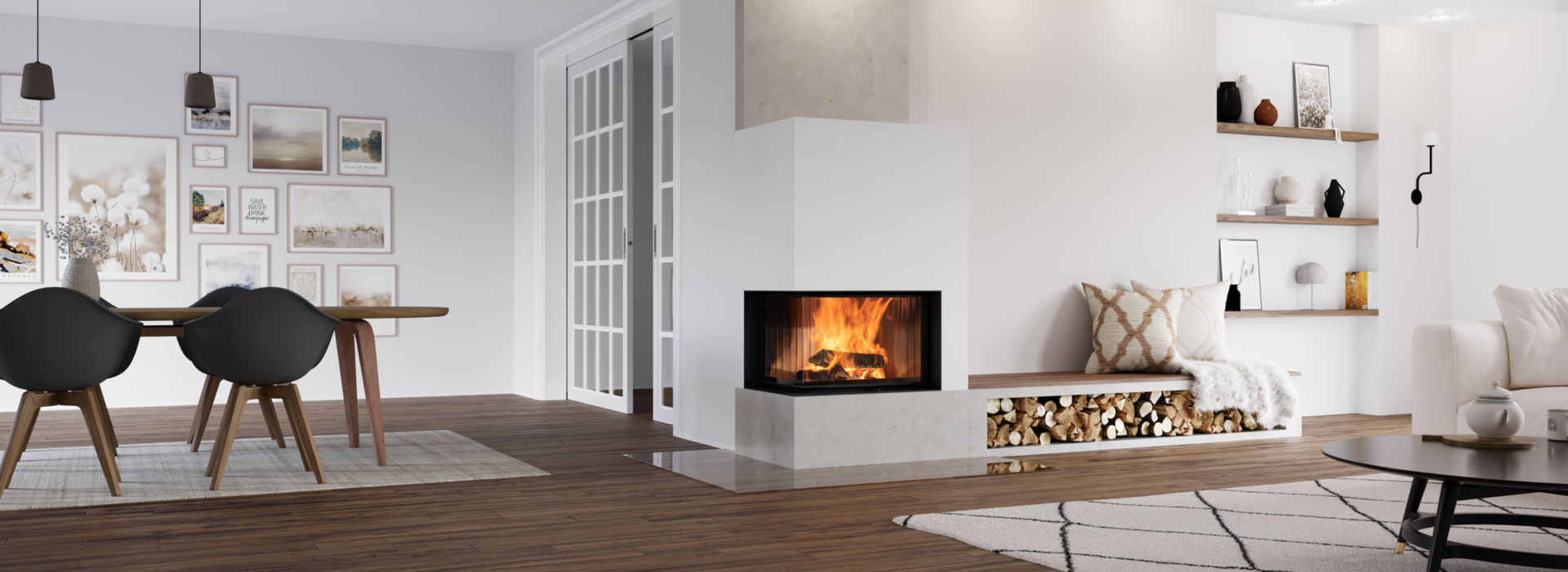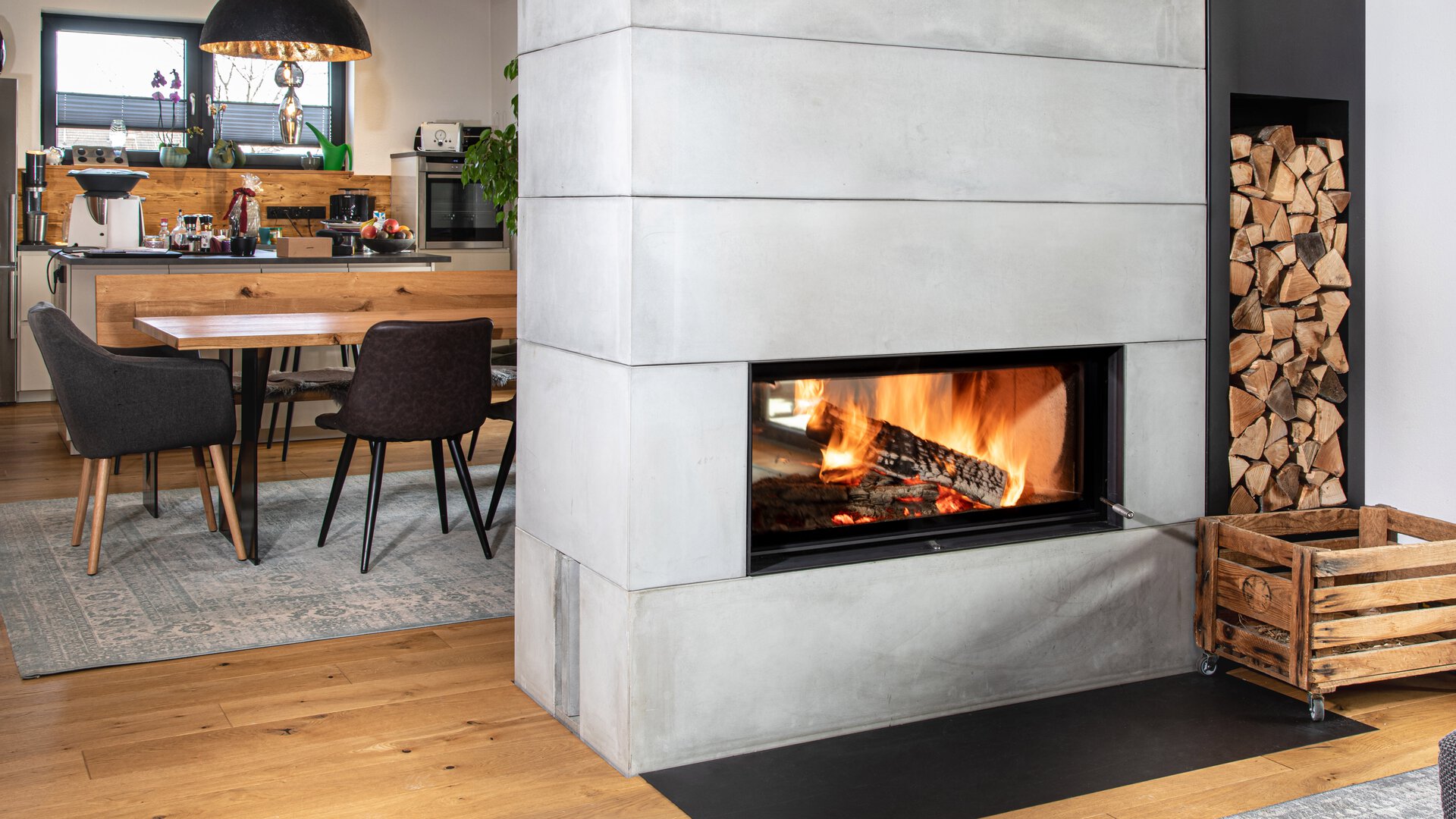Fireplace
The Perfect Fire
With an outstanding variety of glass formats
You are toying with the idea of buying a fireplace? Because on cold, dark winter days nothing spreads more comfort than a stove? And nothing arouses more emotion than its blazing fire? Then go for it. The view of the flames is calming and the warmth is good for you, all year round. Large glass formats are particularly popular. The heat output of a fireplace is secondary.
The future of eco-friendly heating
Our brand new BKH green fireplace inserts impress with the latest technology. The central element is the new, energy-efficient and industry-wide unique grateless combustion system. The whole thing is combined with the usual straightforward and visually high-quality design as well as an optional catalytic converter that can be retrofitted. This means: a perfect flame pattern and lowest emissions at the same time.
BRUNNER "green-line" is the generation of excellent, climate-friendly heating fireplaces that you have been looking for in vain on the market so far.
We have taken care to optimally combine environmental compatibility and user experience. The result is a system that is really fun to use: with this revolutionary heating fireplace, you heat in a decidedly environment-friendly way. Every BRUNNER fireplace of the new generation is already "green", which means that it is far below the current limit values and, thanks to the increase in efficiency, significantly less wood is used.
"Actually, we have reinvented everything - except the fire. That already existed before.”

For priority fire atmosphere with warmth
A classic fireplace is a fireplace that provides heat quickly and offers plenty of visible fire. It consists of a firebox, a smoke collector and a connecting pipe to the chimney. The large and projecting glazing of a fireplace heat the room immediately and directly, transporting the heat through the air. Fireplaces are mainly fuelled by wood, although there are also gas fireplaces.
Fireplaces are now one of the most preferred types of wood fires, and their design is varied. Here, the fire does not burn in an open fireplace as in the past, but in a fireplace insert. There are two reasons for this: The efficiency is much higher this way and the emissions are considerably lower. The change from an open fireplace to a closed firebox in which combustion can be controlled was made possible by the invention of the ceramic glass window. In most cases, the construction of a fireplace consists of steel, a special fireplace glass and, in the case of high-quality firebox, real fireclay brick. The open side of the firebox is the firebox opening through which the system is loaded with wood and the ashes are removed.
There are many manufacturers and brands that offer fireplace inserts, but the inserts from the Lower Bavarian specialist BRUNNER are made of steel. They are available in many different glass formats with a revolving door and a viewing glass that can be pushed up, as well as variable reheating surfaces. The format and construction chosen usually depends on individual needs and living situations. In Switzerland, by the way, the term fireplace refers to the chimney.
Fireplaces
What is fit for me?
Nothing arouses more emotion than the cosy atmosphere of a fireplace: fireplaces from BRUNNER are the ideal solution for all customers who not only want to feel wood fire, but also experience it.
Heating fireplaces are installed when priority atmosphere is desired. The design, fuel quantity and the associated heating output fit in this design. BRUNNER steel heating fireplace inserts are available in many different glass formats with revolving door or sliding viewing glass as well as variable reheating surfaces - for the perfect atmospheric fire with heat effect as desired.
At first glance, firebox dimensions and glass formats appear comparable. It is only on closer inspection and at the latest during operation that price or function-optimised product developments by the respective manufacturers can be recognised. BRUNNER works with optimised function and quality - uncompromising down to the last detail. BRUNNER steel heating fireplace inserts are available in many different glass formats with revolving door or sliding viewing glass as well as variable reheating surfaces.
Quick-reaction furnace
Fast warm, but also fast cold again
A heating fireplace or wood stove with a metal reheating surface is a so-called fast-reaction furnace. This means that after the first burn you have to add fuel about every 3 hours to keep the heat development stable. This can consume a lot of firewood. As a quick-reaction furnace, a fireplace provides rapid heat because storage elements do not have to be heated up for a long time first. This is appreciated not only by working people who want quick and pleasant warmth for a few hours after work.


Heating fireplace principle
The secret of the clean viewing glass
Technical design, chimney draught, wood humidity, quantity of wood and operation are the important factors for a clean viewing glass*).
Technical design
At BRUNNER, the combustion air conduct is designed to minimise deposits of soot and dust particles.Supplied air is streaming along the viewing glass. Tight door profiles and precise lifting mechanism ensure that this “protective screen” works properly and that there are no soot stains on the glass. Fireplaces with two- or three-sided glazing (Eck, Panorama) and turbulent streams around the corners must be cleaned more often.
Low chimney draught
When the chimney draught is too high or too low, the adjustable combustion air openings are not enough to compensate the negative air flow conditions,which lead to increased soot deposits. BRUNNER has technically optimised this, e.g. with the Sissi flap. Occasional operation in adverse weather conditions cannot be excluded and must be accepted from time to time.
Humidity and quantity of wood, mode of operation
The fuel quality and quantity have a significant influence on the cleanness of a viewing glass. The required temperature and the air flow for the self-cleaning system can be established under normal operating conditions only when dry wood is used (residual humidity < 20 %) and the quantity of wood does not exceed the recommended value for a given fireplace. The glass gets stained and sooty.
*)Glass cleaning is necessary after 2 – 10 combustion cycles and depends on the intensity of use and the conditions during each cycle. Ceramic glass cleaning must be performed on a regular basis
Room air dependent or room air independent?
For a fire to burn, it needs not only the fuel wood, but also oxygen. A fireplace gets this either from the room where it is installed or via an extra connection. A distinction is therefore made between a room-air-dependent and a room-air-independent fireplace.
In a room-air-dependent fireplace, the oxygen supply can be regulated using different adjustment levers on the appliance. To ensure that the wood burns well and that combustion proceeds optimally, the fire should not be deprived of air too early, for example. In addition, there must always be enough oxygen in the room where the fire is set up, which means regular ventilation. Otherwise there is a risk of dangerous negative pressure. However, if handled correctly, a room-air-dependent fireplace is not a problem. With a room-air-independent fireplace or stove, forced ventilation is not necessary, because these appliances do not consume room air. Instead, they receive their air via their own separate air duct or an outside air connection. In new buildings, these air ducts should already be included in the planning. They are even mandatory for passive and low-energy houses.

Easy to operate
Simple and uncomplicated
Manually operated or automated
The combustion air can be controlled manually with just one operating element (lever). Effortless and easy to understand. The symbols on the glass provide additional support.
Of course, the white display (EAS) shows that it can also be operated automatically. The most convenient version is the combination with an electronic combustion control (EAS). All you have to do is light the stove or add fuel, the control system takes care of everything else. High efficiency is the result, because the EAS servomotor never forgets to readjust and always stops the combustion air supply at the end of the burn-off. This is particularly convenient if the stove cannot be operated any further after its kindling, either because you go to bed or you leave the house.

The Open Fireplace
An open fireplace is an experience for the emotions. It conjures up a wonderful atmosphere and is probably the oldest type of fireplace. Here, heat is not emitted through large windows but through the combustion room opening and you are very close to it, no glass front separates you from the play of flames. Instead, the original fireplaces from BRUNNER are equipped as standard with a spark guard that is invisible to the human eye. It prevents embers from falling out. Original fireplaces have another important detail: Because open fireplaces draw a lot of oxygen from the room where they are installed, the systems regulate the pressure balance specifically via a supply and exhaust air system with an outside air connection. This ensures that the fire is always supplied with sufficient air. This prevents negative pressure from developing and flue gas from being drawn into the living space.

Fireplace: Where should I place it?
Modern fireplaces should above all be visually pleasing. With their large viewing glass, they offer a maximum view of the flames and often function as a chic room divider. Or they are a real eye-catcher in corner format. But the stylish fireplace should not only be clearly visible, there are also a number of things to bear in mind when placing it.
- For one thing, there must be sufficient distance from combustible materials. Parquet flooring or carpet can be protected with special fire protection underlays, for example glass, slate or metal plates. To ensure that everything is safe from possible flying sparks, the cover in front of the fireplace should extend about 50 (19.6 inches) centimetres into the room, and about 30 centimetres (11.8 inches) at the sides. Glass panels whose edges are sealed with silicone prevent dust from collecting under them.
- A distance must also be kept from the installation wall. The size of the distance depends on the stove model, as a rule it is between 20 and 60 centimetres (7.8 and 23.6 inches).
- A distance of at least 80 centimetres (31.4 inches) must be kept between furniture and the fireplace. For side windows, 65 centimetres (25.5 inches) are sufficient.
- A fireplace can weigh quite a bit, depending on the design. It is therefore important that the substrate can bear the weight and that the static requirements are met. It must also be fireproof.
- The size of a fireplace depends not only on the location, but also on the flue gas capacity of the chimney. To ensure that the exhaust gases are properly discharged, a chimney sweep should be consulted before buying a fireplace. He will inspect the rooms and identify possible risks.
Where can I store firewood?
If you heat a flat or house with wood as a fuel does something good for the environment because you heat in a climate-neutral way: only as much CO2 is released as the tree has stored through its growth and would release back into the environment during natural decomposition. The fact that the combustion process in the fireplace or stove is clean and low-emission depends to a large extent on the quality of the wood and its storage. Freshly cut wood should never be used for heating immediately, as it is much too moist. It should therefore be allowed to dry for at least a year. Damp wood is not only inefficient, it also develops heavy soot formation, which in the worst case can lead to soot fires. That is why the law stipulates that the moisture content of firewood must not be higher than 25 percent. The optimum is 15 percent. In order for the logs to dry properly, they need to be stored in a place where the air can circulate and the sun can shine on them. Adequate protection against moisture is important, preferably on the wall of the house protected by a roof that reaches far down, the west or south side is recommended. A self-built shelter with a corrugated iron roof is also suitable. The firewood should not be stacked directly on the ground, because this could also be damp and mould the stack from below. A base can easily be constructed from pallets or battens.

Where can I buy firewood?
The price of wood is much lower and more stable than, for example, oil or gas, and the costs are therefore much more calculable. And firewood can usually be bought regionally. If it is cut or collected in the forest itself, it is cheapest. Information on this can be obtained from the local forestry offices. They then assign a certain area in which the previously agreed amount of wood may be collected. A cubic metre then usually only costs between 25 and 30 euros. However, the wood is fresh and must first be stored. If you want to cut wood yourself, you have to present a "firewood licence". Generally speaking, the more refined the wood, the more expensive it is. Hence the price difference between wood chips, logs and fuel for pellet stoves.

A classic fireplace is a wood stove that primarily provides quick heat and lots of visible fire. Through large, projecting glazing (or firebox openings, for example in an open fireplace), the heat can be released quickly and directly into the living space. The heat is transported directly through the air, creating a kind of heat exchange. Fireplaces are now one of the most popular types of wood stoves, as they fit in well with the lifestyles of modern people. In the vast majority of cases, the construction consists of steel, special fireplace glass and - at least in the case of high-quality fireboxes - real fireclay stone.
As the name suggests, a classic storage heater (tiled stove, masonry heater, etc.) stores heat and releases it over a longer period of time. This is done by means of a sometimes very heavy storage, so-called ceramic flues, which absorb energy from hot heating gases by means of friction. It is not unusual for this mass to weigh more than a tonne. A fireplace does not have such a storage and releases heat directly into the living space via the glass. On the one hand, this has the advantage that the heat - in contrast to a masonry heater - is not felt after one or two hours, but already after a short heating phase. On the other hand, the lack of storage elements means that the demands on the fireplace construction are significantly lower than for a tiled or masonry stove, for example. However, the latter have the advantage of heating the living space longer by emitting pleasant radiant heat and also offer health benefits, for example for allergy sufferers.
A high-quality fireplace system is not a finished product, but is individually planned and built for the customer. For this purpose, stove and air heating installers, or "stove fitters" for short, complete many years of training and are trained in all disciplines of stove construction. A high-quality stove must not only meet the requirements of the existing living room design and the personal taste of the customer. It must also be thermally adapted to the conditions of its environment. Nobody wants a fireplace that turns the room into a sauna or does not provide enough heat to make you feel comfortable even on the coldest winter days. Only a qualified craftsman can optimally combine these demands on design, thermal architecture and function.
The advantages of individual, handcrafted fireplace and stove construction, in overview:
- Preliminary discussion of the project
- Optional on-site inspection of the premises
- Individual planning, usually including adaptation requests by the customer.
- High-quality construction due to high-quality materials and inserts
- Clean implementation
- Customer service and "After-sales service”
- Extended warranty with services of up to 5 years
The diversity of wood firing combustion systems is also based in particular on the diversity of different lifestyles and situations. Not every wood heater is the same. And that is why it is important to choose a solution that suits you. Above all, a fireplace satisfies the demand to be visually pleasing. Large viewing glass, sometimes as room dividers or in corner format, offer maximum visibility of fascinating flame images. As a quick-reaction furnace, a fireplace also provides quick heat without the need to heat up storage elements over a long period of time. Thus, a fireplace is particularly suitable for friends of visual fire atmospheres who not only want to feel a wood fire, but also experience it visually. Working people and all those who spend less time at home also enjoy the fact that a fireplace can generate quick and pleasant heat for a few hours.
A wood stove differs mainly in the way it is built. As a finished product, available especially cheaply in DIY shops and online shops, it is merely purchased and connected like a consumer good. The heating system cannot be individually adapted to the customer's living conditions and premises; individuality is only created by a selection of models. Just like the motto: put it down, plug it in, heat it up. Practical - but anything but flexible. A fireplace, on the other hand, is an individual furnace that is planned by an experienced, well-trained craftsman and specially adapted to your needs. So you are not buying a ready-made product "off the peg", but a special piece of (thermal) architecture for your home.
The best fireplaces and tiled stoves are created in dialogue between experienced top craftsmen and accomplished companies whose products are manufactured on the basis of innovation and constant improvement. After more than 70 years on the market and with more than 1,000 craftsmen partners throughout Europe, BRUNNER is one of these companies. We take time for our partners, for our customers and for our products. BRUNNER only uses the highest quality materials, 100% MADE IN GERMANY. A quality promise that we have set as our top priority. And if things still don't work out, we are always there for our customers. We offer service, repair and help and do not pay attention to guarantee guidelines first, but to making sure that the customer is as satisfied as possible.
Consult your furnace builder to find the right heating insert for your home.
Also use our social media channels to get inspired.

